19 May2016
By Charlotte Danielson
Danielson Group Founder Charlotte Danielson was a featured speaker at last month’s National edTPA Implementation Conference in Savannah, Georgia. The views expressed in this post do not necessarily reflect the views of AACTE.
edTPA, in a few short years, has made an important contribution to what it means to be a professional educator, by focusing not only on the work of teaching, but on the thinking that underlies all professionalism.
The three tasks of edTPA reflect the essential work of teaching: planning, teaching lessons to students, and incorporating assessment strategies into that endeavor. edTPA requires prospective teachers to engage in those essential activities of teaching, and to submit evidence in portfolio tasks. But as important (some would argue more important), edTPA requires prospective teachers to not only engage in these essential tasks of teaching, but also reflect on what they do, and explain their reasoning.
17 May2016
By Gail Bozeman
Several members of AACTE’s Member Engagement team attended the U.S. Department of Education’s May 6 National Summit on Teacher Diversity. The event, held at the conclusion of Teacher Appreciation Week, provided a forum to examine the need for a more diverse teaching workforce and to share best practices for recruiting, supporting, and retaining teachers of color.
Secretary of Education John B. King, Jr., offered opening remarks about the importance of diversifying the educator pipeline. “Students of color would benefit from having more educators and role models who look like them,” he said. “And White students would benefit from seeing more people of color in leadership positions in their schools.”
17 May2016
By Zachary VanHouten
Join AACTE Government Relations Director Deborah Koolbeck for an update on the latest developments in Washington, DC, at one of two free webinars this month exclusively for AACTE members.
Learn about the state of the appropriations process, action on the proposed regulations on teacher preparation programs, ESSA implementation, and movement on other important legislation.
The webinars will be offered on separate dates and at two times of day to accommodate different time zones. A recording will be made available after the events on AACTE’s Resource Library in case you’re unable to attend either session. Click on your preferred session below to register:
Tuesday, May 24, 5:00 – 6:00 PM EDT
Wednesday, May 25, 10:00 – 11:00 AM EDT
17 May2016
By Katrina Sheffield
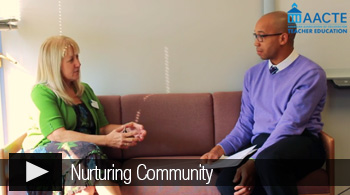
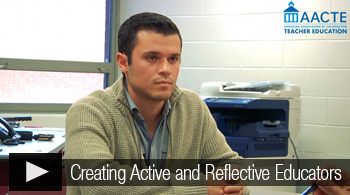
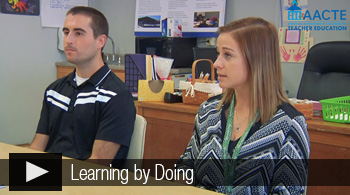
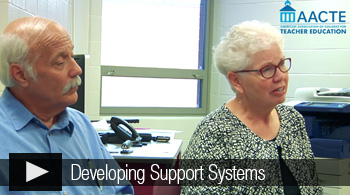
A new set of brief videos in AACTE’s Research-to-Practice Spotlight Series focuses on operationalizing clinical practice through the award-winning partnerships of Ohio University’s Patton College of Education (see this article introducing the series and this overview of the first three videos). Today’s article highlights messages from the next four segments, which feature students and leaders from the college as well as from its partner schools.
The Patton College of Education at Ohio University and its partner schools nurture future teachers with extensive and hands-on experience in classrooms. Teacher candidates play an active role from early in their college years, actively participating and working closely with veteran educators to develop their own proficiency.
17 May2016
By Yupin Bae and Michelle Kotek
Editor’s note: As AACTE moves from collecting information through the Professional Education Data System (PEDS) to tapping other nationally available data sources on educator preparation, we will be providing periodic data snapshots from these sources. The following article presents data from the latest available (2014) federal collection mandated by Title II of the Higher Education Act, which includes 1,497 providers of “traditional” programs based in institutions of higher education (IHEs), 472 providers of IHE-based alternative programs, and 201 providers of non-IHE-based alternative programs.
This is the first of six blog articles that will explore the Title II data on educator preparation program admission and completion requirements. Teacher quality is an ongoing concern, and the field of teacher preparation plays an important role as the profession’s entry point. Contrary to some beliefs that preparation programs have few or no requirements for entry and exit, the data show that most providers have many and varied criteria for prospective educators at the beginning and end of their preparation programs. This blog series aims to help affirm the common criteria and explore others that are not as well-known.
16 May2016
By Alicia Okpareke and Cris Chacon
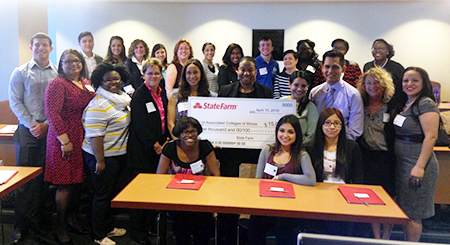
Lisa LaDonna Cooper and Linda Mitchell of State Farm present funds to the ACI Center to support Project LEAD during the spring summit in Chicago.
In April, faculty and teacher candidate “ambassadors” representing institutions in the Associated Colleges of Illinois (ACI) convened in Chicago to take part in the Project LEAD (Leaders in Education Advocating for Diversity) Spring Summit. The summit, conducted by the ACI Center for Success in High-Need Schools, followed up on the inaugural Project LEAD meeting that took place last fall. (Read more about that meeting here.)
The day began with a welcome and celebration of the ACI Center and the initial successes of Project LEAD by its sponsor, State Farm. This included a brief talk by Community Relations Specialist Lisa LaDonna Cooper as well as an exciting presentation of funds to support participating institutions.
16 May2016
By Melvin Bogard
Ed Prep Matters is featuring “Stories of Impact” to showcase AACTE member institutions with educator preparation programs that are making a positive impact in their communities and beyond through innovative practices. We are committed to sharing members’ success stories and encourage you to do the same.
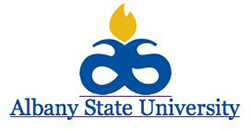 The clinical practice partnership between Georgia’s Albany State University (ASU) College of Education and nearby Live Oak Elementary is bringing mutual benefit to the elementary students and the ASU teacher candidates. The field-based preparation model they have cultivated around the school’s learning goals promotes growth for all involved.
The clinical practice partnership between Georgia’s Albany State University (ASU) College of Education and nearby Live Oak Elementary is bringing mutual benefit to the elementary students and the ASU teacher candidates. The field-based preparation model they have cultivated around the school’s learning goals promotes growth for all involved.
The hands-on assistance and dedication of the teacher candidates are helping to close literacy achievement gaps for Live Oak second-graders, for example, through the partners’ remedial reading practicum in the early childhood education program.
16 May2016
By Anna E. McEwan

Chapter leaders listen intently at the 2015 State Leaders Institute
In 2015, I participated for the first time in AACTE’s State Leaders Institute (SLI). In thinking about what I gained from participation, the phrase that comes to mind again and again is a sense of connection.
Psychological research suggests that those who feel consciously connected with others—or with their environment, or with anything that is larger than themselves—tend to be more physically and mentally healthy than others. Perhaps it’s too lofty to suggest that your participation in SLI will improve your overall well-being, but I can testify to several practical benefits!
16 May2016
By Ena Shelley, Kandi Hill-Clarke and Judy Sheese

Members of the IACTE Executive Committee at the chapter’s inaugural Day at the Statehouse in February
Last year, the Indiana Association of Colleges for Teacher Education (IACTE) received an AACTE State Chapter Support Grant to fund the creation of a statewide advocacy consortium. In order to disrupt the dominant discourse that negatively portrays teacher education programs, educators, and schools, IACTE sought to collaborate with “partners in practice” to tell positive stories and create a unified message of the education profession. We held a series of productive conversations and meetings, culminating in the capstone experience of the first IACTE “Day at the Statehouse” event in February.
Our partners in this work included the Indiana Association of Public School Superintendents, the Indiana Association of School Principals, the Indiana State Teachers Association, the Indiana School Boards Association, and the education honorary, Kappa Delta Pi.
12 May2016
By Suzie Henderson
The author, assistant principal at Pepperell Elementary School in Lindale, Georgia, is one of several PK-12 educators who presented on their experiences with edTPA and their partnerships with educator preparation providers at last month’s 2016 edTPA National Implementation Conference in Savannah, GA.
Do you want to strengthen relationships between PK-12 administrators and educator preparation faculty? Try going out for lunch.
That’s how the relationship between Pepperell Elementary School, where I’m an assistant principal, and the Shorter University School of Education really took off.
I was at lunch a few years ago with Kristy Brown, who supervises student teaching for Shorter. I told her my staff needed professional development in teaching writing skills to our diverse learners. She said she needed classrooms to host teacher candidates for their clinical experiences.
12 May2016
By Terrance McNeil
 Congratulations to May Holmes Scholar of the Month DeShawn Sims!
Congratulations to May Holmes Scholar of the Month DeShawn Sims!
Sims is a third-year doctoral student in the counselor education program at the University of Central Florida. Her research interests include mobile technology, pedagogical and learning influences in urban classrooms, and creating effective urban educators.
Sims’ nomination stated that she demonstrates regular and impeccable service to the community. With her passion for urban education, she is constantly using her voice to advocate on behalf of this platform. Sims serves with the Urban Initiative Special Interest Group, an Orlando partnership that aims to tackle challenges in urban communities. She has presented at several national conferences and continues to build her curriculum vitae with accomplishments.
10 May2016
By Rodrick Lucero
The National Policy Board for Education Administration (NPBEA) seeks comment by May 22 on new draft standards for leadership preparation programs. Once approved, these preparation standards will replace the Educational Leadership Constituent Council (ELCC) standards and be used to guide the educational leadership program design, accreditation review, and state approval of preparation programs for principals and superintendents.
The proposed National Educational Leadership Preparation (NELP) Standards specify what novice leaders should know and be able to do, at the building and district level, after completing a high-quality educational leadership preparation program. The new draft aligns the standards for preparation programs with the Professional Standards for Educational Leaders (PSEL) approved by NPBEA last fall. Formerly known as the Interstate School Leaders Licensure Consortium (ISLLC) standards, the PSEL standards articulate the knowledge and skills expected of school leaders broadly.
10 May2016
By Tommy Navickas
This article originally appeared on the Illinois State University news site. It is reposted here with permission. The views expressed in this article do not necessarily reflect the views of AACTE.
Last fall semester, Blake Slutz ’15 was among Illinois State University’s 47 special education graduates. He and his fellow new alumni all passed the edTPA test during their student teaching semesters. Their success was not isolated. Across the university’s entire education program, the largest in the state, 99% of teacher candidates passed the assessment. Illinois State’s performance far exceeded the national average of 85%.
10 May2016
By Terrance McNeil
The author is the administrator for AACTE’s newly formed “Issues in HBCU Education” topical action group (TAG). The views expressed in this post do not necessarily reflect the views of AACTE.
Did you know that 25% of bachelor’s degrees in education conferred upon African Americans are awarded at historically Black colleges and universities (HBCUs)? In addition, HBCUs with educator preparation programs have consistently produced more African-American graduates in the science, technology, engineering, and math (STEM) fields than any other type of institution. The success of HBCUs at educating students for the 21st century workforce could be a signal to educational leaders to seek the HBCU as a source for making large-scale improvements among African American students on the PK-12 level.
09 May2016
By Kristin McCabe
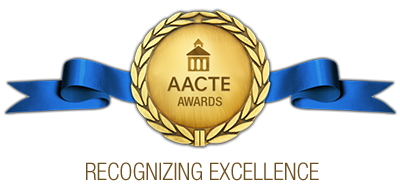
AACTE is now accepting nominations for the 2017 Outstanding Book Award. Nominations must be made through our online submission system by June 14.
The Outstanding Book Award recognizes books that make a significant contribution to the knowledge base of educator preparation or of teaching and learning with implications for educator preparation. Last year’s winner was Etta Hollins’ Rethinking Field Experiences in Preservice Teacher Preparation: Meeting New Challenges for Accountability (Routledge), and the 2015 winner was Nel Noddings’ Education and Democracy in the 21st Century (Teachers College Press); check our online honor roll for other great recommendations for your summer reading list!







 The clinical practice partnership between Georgia’s
The clinical practice partnership between Georgia’s 

 Congratulations to May Holmes Scholar of the Month DeShawn Sims!
Congratulations to May Holmes Scholar of the Month DeShawn Sims!